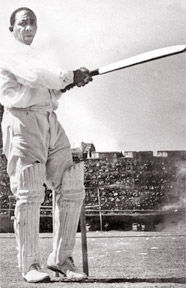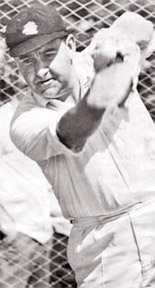Cowdrey and Constantine fittingly rewarded
By A. C. De Silva
Great cricketers duly rewarded... There have been many cricketers
from overseas who have made their presence felt in no uncertain manner
overseas and also made their presence felt whenever they got the chance
of playing in Sri Lanka.
There have been big names on the cricketing front who have been
household names, but two names that stand out are Lord Colin Cowdrey of
England and the other – Lord Learie Constantine of the West Indies.
Though both are not amongst the living, they had played their parts well
and will be remembered for ever. Lord Constantine died on July 1st in
1971 and Lord Cowdrey passed away on the fifth of December 2000 at the
age of 67 years.
|

Lord Learie Constantine – cricket star, diplomat and
politician. |

Lord Colin Cowdrey came to the top the hard way. |
Both cricketers have made their presence felt here in Sri Lanka
whenever they played matches here.Cowdrey was finally made a Commander
of the Order of the British Empire (CBE) in 1972, received his
knighthood in 1992, and became a life peer as Baron Cowdrey of
Tonbridge, in the Country of Kent in 1997 on the recommendation of the
outgoing then Prime Minister John Major.
Cowdrey was one of only two cricketers to be given a life peerage his
services to the game of cricket, the other gentleman was West Indian
star Learie Constantine, grandson of a West Indian worker, a cricket
star, diplomat and politician. He went on to become one of the greatest
allround players the game has ever known.
Constantine, a Barrister-at-law practising in London, found time to
come to Sri Lanka (Ceylon then) in 1952, putting aside a lucrative
practice to serve the cause of Cricket in coaching the schoolboys and
club cricketers and giving them the expert knowledge that he had had
gained from the international arena. But before he came here, he stood
tall in Trinidad and the West
Indies. Constantine had played his part well and served West Indies
cricket well. He was a right-hand batsman and a right-arm medium-fast
bowler. It is sometimes a loosly used term ‘failures are the pillars of
success’ and this is applicable to Constantine who in his first Test
against England in 1928 at Lord’s, was out for 13 in the first innings
and for a ‘duck’ in the second, both times falling to England’s Freeman.
He fared much better in bowling, taking 4 for 82.
That was only a beginning, as Constantine kept on improving with each
passing match. Then his fielding made many a mediocre bowler look first
class. During a Test in the West Indies, Achong, a slow bowler was
keeping George Gunn quite.
Constantine at slip, edged close in. Had Gunn slashed and connected
his head would have blown off. But Gunn played forward defensively and
Constantine, with a leap took the ball near the ground in front of the
bat.
Early in his career he was a very fast bowler, Later he developed
guile and sometimes bowled an ever of six entirely different balls the
deadliest being a slow googly with a fast action.
But cricket was only one facet of Constantine’s life. He wanted to be
a Barrister and in Trinidad had worked as a court clerk, conveyancing
clerk and finally chief clerk. When the chance came on to turn
professional for Nelson, a Lancashire League club, he took it at a
record fee with bonuses of 25 Sterling Pounds for every 50 runs or five
wickets, and the money he put by enabled him to study for his loved
subject Law.
After the war, he returned to his studies and was called to the Bar
in 1954. He also wrote, broadcast and entered political life and finally
was appointed Minister of Works and Transport in his native Trinidad.
Coming on to Michael Colin Cowdrey, Known as Lord Cowdrey of
Tonbridge, as he had been known since his elevation to the peerage in
1997, served the game with distinction as a player, captain and
administrator for more than half a century.
The first person to play in 100 Tests, his England career began on
the 1954-55 tour of Australia and New Zealand as a 21-year-old. It ended
in Australia 20 years later when he was called out from England in
December 1974 as an emergency player after injuries to key batsman.
He played out the final five matches on that series, finishing with
an unprecedented 114 Test appearances to his name.
His career aggregate of 7,624 Test runs (at an average of 44.06) with
22 centuries) was at the time a world record, as was his record for a
non-wicket-keeper of 120 catches, many taken at slip.
Peter May died 1994
Among his greatest batting achievements was his contribution to a
fourth-wicket partnership of 411 which is one world record that still
stands – tandem with Peter May against the West Indies at Edgbaston in
1957. Cowdrey scored 154, while May, who died in 1994, made 285 not out.
His highest Test score, 182, was achieved at the Oval against Pakistan
in 1962.
Frequently chosen as Vice-captain on overseas tours, his first
opportunity to captain England came against India in 1959, but it wasn’t
until the late sixties that he led his country with any regularity.
With his last Test as England in Pakistan in 1969, after which the
mantle was passed to Ray Illingworth, Cowdrey had a record of 8 wins and
4 losses in 27 Tests at the helm.
Colin Cowdrey celebrated his unprecedented 100th Test appearance, at
Edgbaston against Australia in 1968, in the only way possible – by
scoring a hundred.
Cowdrey had long and successful carer for Kent in the county
championship, stretching from 1950 to 1976.
He also represented Oxford University from 1952 to 1954. In 692
first-class appearances, he scored 42,719 runs at an arrearage of 42.89
with 107 centuries. His highest score was 307 for the Marylebone Cricket
Club against South Australia at the Adelaide Oval in 1962-63.
Youngest to play at Lord’s
The youngest person ever to play at Lord’s as a 13 year-old
schoolboy, Cowdrey’s association with the game extended well beyond his
retirement as a competitive player at the age of 43. In 1986-87 he
served a one-year term as president of the organisation with whom he
shares his initials – the MCC.
From 1989 to 1993 he served as president of the International Cricket
Council, a period which saw great change in the operations of the ICC
itself as well as the return to international cricket of South Africa.
Cowdrey was president of the Kent County Cricket Club at the time of
his death, having been appointed earlier this year. The second of three
generations of the first-class cricketers,Michael Colin Cowdrey was born
on 24 December 1932 at Putumala, India.
|

